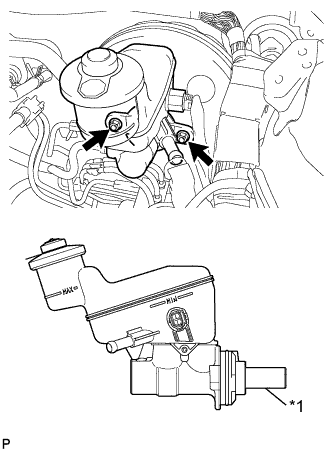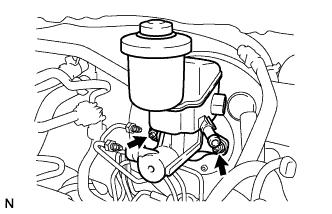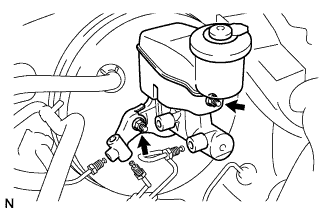REMOVE BRAKE MASTER CYLINDER SUB-ASSEMBLY (for ABS with VSC)
REMOVE BRAKE MASTER CYLINDER SUB-ASSEMBLY (for ABS without VSC)
Brake Master Cylinder (For Sedan) -- Removal |
- NOTICE:
- Release the vacuum from booster by depressing the brake pedal several times.
- Then remove the brake master cylinder from brake booster.
| 1. DRAIN BRAKE FLUID |
- NOTICE:
- Immediately wash off any brake fluid that comes into contact with any painted surfaces.
| 2. REMOVE BATTERY |
Disconnect the cable from the battery terminal.
Loosen the nut and remove the battery clamp.
Remove the battery.
| 3. REMOVE BATTERY TRAY |
| 4. REMOVE BATTERY CARRIER |
 |
Separate the wire harness clamp from the battery carrier.
Remove the 5 bolts and remove the battery carrier.
| 5. DISCONNECT CLUTCH RESERVOIR TUBE (for Manual Transaxle) |
 |
Slide the clip and disconnect the reservoir tube.
| 6. REMOVE BRAKE MASTER CYLINDER SUB-ASSEMBLY (for ABS with VSC) |
Disconnect the brake fluid level warning switch connector.
Using a union nut wrench (12 mm), separate the 2 brake tubes from the brake master cylinder sub-assembly.
 |
Remove the 2 nuts and remove the brake master cylinder sub-assembly.
Text in Illustration *1 Piston
 |
Remove the O-ring from the brake master cylinder sub-assembly.
- NOTICE:
- The master cylinder requires careful handling. Do not allow the master cylinder to receive any impact, such as from being dropped. Do not reuse a master cylinder that has been dropped.
- Do not strike or pinch the master cylinder piston, and do not cause any damage to the master cylinder piston by any other means.
- Release the vacuum from the booster by depressing the brake pedal several times. Then remove the brake master cylinder from brake booster.
- When installing the brake master cylinder sub-assembly onto the brake booster, or when removing the brake master cylinder sub-assembly from the brake booster, make sure that the brake master cylinder sub-assembly is kept horizontal or its tip faces downward (the piston faces upward) to prevent the master cylinder piston from falling off.
- Do not allow any foreign objects to contaminate the master cylinder piston. If a foreign object gets on the piston, remove it by using a piece of cloth and then apply an even layer of lithium soap based glycol grease around the circumference (sliding part) of the piston.
- Do not use any other type of grease or fluid.
| 7. REMOVE BRAKE MASTER CYLINDER SUB-ASSEMBLY (for ABS without VSC) |
Disconnect the brake fluid level warning switch connector.
Using a union nut wrench (10 mm), separate the 2 brake tubes from the brake master cylinder sub-assembly.
 |
Remove the 2 nuts and remove the brake master cylinder sub-assembly.
 |
Remove the O-ring from the brake master cylinder sub-assembly.
- NOTICE:
- The master cylinder requires careful handling. Do not allow the master cylinder to receive any impact, such as from being dropped. Do not reuse a master cylinder that has been dropped.
- Do not strike or pinch the master cylinder piston, and do not cause any damage to the master cylinder piston by any other means.
- Release the vacuum from the booster by depressing the brake pedal several times. Then remove the brake master cylinder from brake booster.
- When installing the brake master cylinder sub-assembly onto the brake booster, or when removing the brake master cylinder sub-assembly from the brake booster, make sure that the brake master cylinder sub-assembly is kept horizontal or its tip faces downward (the piston faces upward) to prevent the master cylinder piston from falling off.
- Do not allow any foreign objects to contaminate the master cylinder piston. If a foreign object gets on the piston, remove it by using a piece of cloth and then apply an even layer of lithium soap based glycol grease around the circumference (sliding part) of the piston.
- Do not use any other type of grease or fluid.
| 8. REMOVE BRAKE MASTER CYLINDER SUB-ASSEMBLY (w/o ABS) |
Disconnect the brake fluid level warning switch connector.
Using a union nut wrench, separate the brake tubes from the brake tube way and brake master cylinder sub-assembly.
 |
Remove the 2 nuts and brake tube way and remove the brake master cylinder sub-assembly.
 |
Remove the O-ring from the brake master cylinder sub-assembly.
- NOTICE:
- The master cylinder requires careful handling. Do not allow the master cylinder to receive any impact, such as from being dropped. Do not reuse a master cylinder that has been dropped.
- Do not strike or pinch the master cylinder piston, and do not cause any damage to the master cylinder piston by any other means.
- Release the vacuum from the booster by depressing the brake pedal several times. Then remove the brake master cylinder from brake booster.
- When installing the brake master cylinder sub-assembly onto the brake booster, or when removing the brake master cylinder sub-assembly from the brake booster, make sure that the brake master cylinder sub-assembly is kept horizontal or its tip faces downward (the piston faces upward) to prevent the master cylinder piston from falling off.
- Do not allow any foreign objects to contaminate the master cylinder piston. If a foreign object gets on the piston, remove it by using a piece of cloth and then apply an even layer of lithium soap based glycol grease around the circumference (sliding part) of the piston.
- Do not use any other type of grease or fluid.